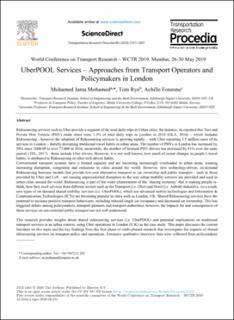| dc.description.abstract | Ridesourcing services such as Uber provide a segment of the total daily trips in Urban cities, for instance, its reported that Taxi and Private Hire Vehicle (PHV) mode share were 1.3% of total daily trips in London in 2014 (GLA, 2016) - which includes Ridesourcing - however the adoption of Ridesourcing services is growing rapidly – with Uber reporting 3.5 million users of its services in London – thereby disrupting traditional travel habits in urban areas. The number of PHVs in London has increased by 58% since 2008/09 to over 77,000 in 2016, meanwhile, the number of licensed PHV drivers has increased by 81% over the same period, (TFL, 2017) - these include Uber drivers. However, it is not well known, how much of recent changes in people’s travel habits, is attributed to Ridesourcing or other tech-driven habits. Conventional transport systems have a limited capacity and are becoming increasingly overloaded in urban areas, creating increasing disruption, congestion and emissions in cities around the world. However, new technology-driven, on-demand Ridesourcing business models that provide low-cost alternative transport to car ownership and public transport - such as those provided by Uber and Lyft – are causing unprecedented disruption to the way urban mobility services are provided and used in urban cities around the world. Ridesourcing is part of the wider phenomenon of the ‘sharing economy’ that is making people re-think, how they avail services from different sectors such as the Transport (i.e. Uber) and Hotel (i.e. Airbnb) industries. As a result, new types of on-demand shared mobility services (i.e. UberPOOL), which use advanced mobile technologies and Information & Communication Technologies (ICTs) are becoming popular in cities such as London, UK. Shared Ridesourcing services have the potential to increase positive transport behaviours, including reduced single car occupancy and decreased car ownership. This has triggered debate among policymakers, transport planners and transport authorities; however, the impacts for and consequences of these services on conventional public transport are not well understood. This research provides insights about shared ridesourcing services (i.e. UberPOOL) and potential implications on traditional transport services in an urban context, using Uber operations in London (U.K) as the case study. This paper discusses the current literature on this topic and the key findings from the first phase of multi-phased research that investigates the impacts of shared ridesourcing services on transport policy and operations. Extensive qualitative interview data were collected from policymakers and operators and key findings from the analysed data are discussed in this paper. The results help to answer key research questions and provide a broad appreciation of these new disruptive mobility services. Keywords: shared Ridesourcing, ride sharing, ride hailing, uber, UberPOOL, shared mobility, disruptive mobility, travel behaviour | en_US |

